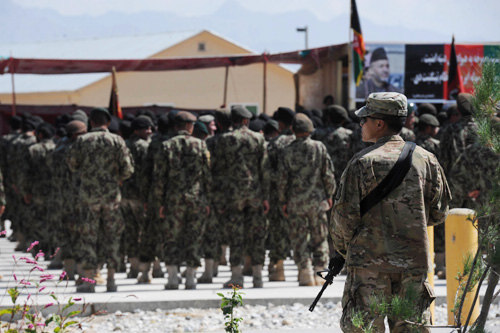|
 |
|
HANDOVER: A U.S. soldier keeps watch during a ceremony to transfer a prison to Afghan authorities at the U.S. airbase in Bagram, north of Kabul, on September 10 (XINHUA/AFP) |
Most political pundits agree that President Barack Obama on October 22 won the third and final U.S. presidential debate, but few suggest that the victory was very meaningful. With just days to go before the November election, Obama and his rival, Republican candidate Mitt Romney, seem unable to move voter polls more than a few percentage points and remain in a dead heat. The debate may have had little impact on voters, but it did offer the world a look at what U.S. foreign policy would likely be over the next four years and what to expect for a drawdown of military action in the Middle East, heightening tensions over Iran and trade battles with China.
Despite the vicious political rhetoric that has characterized the 2012 election campaign, both candidates seemed to agree on a wide range of foreign policy issues. Obama accused Romney of seeking to "do the same things we do but say them louder." Romney repeatedly blamed escalating crises around the world on the failures of the Obama administration, but offered essentially no new ideas or alternatives.
As in most U.S. elections, both candidates have ramped up criticism of the trade deficit with China and pledged to get tough on trade agreements. This type of rhetoric plays well with voters, who are concerned about the strong economic growth of China, which owns more than $1 trillion in U.S. government debt. Obama touted his moves to impose tariffs against Chinese tire imports, steel imports and solar panels.
"We have brought more cases against China for violating trade rules than the previous administration had done in two terms," Obama boasted during the debate.
Romney, though asserting that "we don't have to be an adversary in any way, shape or form," again promised to label China a "currency manipulator" immediately after the election, which led moderator Bob Schieffer to wonder about the possibility of a trade war.
Despite the tough talk, respondents to a national HuffPost/YouGov poll doubted Romney's sincerity. Fifty percent of respondents said they were skeptical that Romney would follow through on his promise to crack down on China's trade policies, while 23 percent said they were confident that he would. The yuan has been appreciating steadily without the direct threat of sanctions, making it unlikely that either candidate would take any drastic action.
The subject of Iran's nuclear ambitions dominated the foreign policy debate, and Romney called it the greatest national security threat to the United States. Again, beyond levying personal attacks, the candidates largely agreed on a policy of continued sanctions to convince Tehran to abandon its nuclear development and agree to UN-backed inspections.
"As long as I'm president of the United States, Iran will not get a nuclear weapon," Obama promised. "I made that clear when I came into office. We then organized the strongest coalition and the strongest sanctions against Iran in history, and it is crippling their economy. Their currency has dropped 80 percent. Their oil production has plunged to the lowest level since they were fighting a war with Iraq 20 years ago. So their economy is in a shambles."
Romney snipped that he would have put sanctions in place earlier and pledged to tighten sanctions even further, barring ships that carry Iranian oil from U.S. ports and to indict Iranian President Mahmoud Ahmadinejad under the UN Genocide Convention.
| 